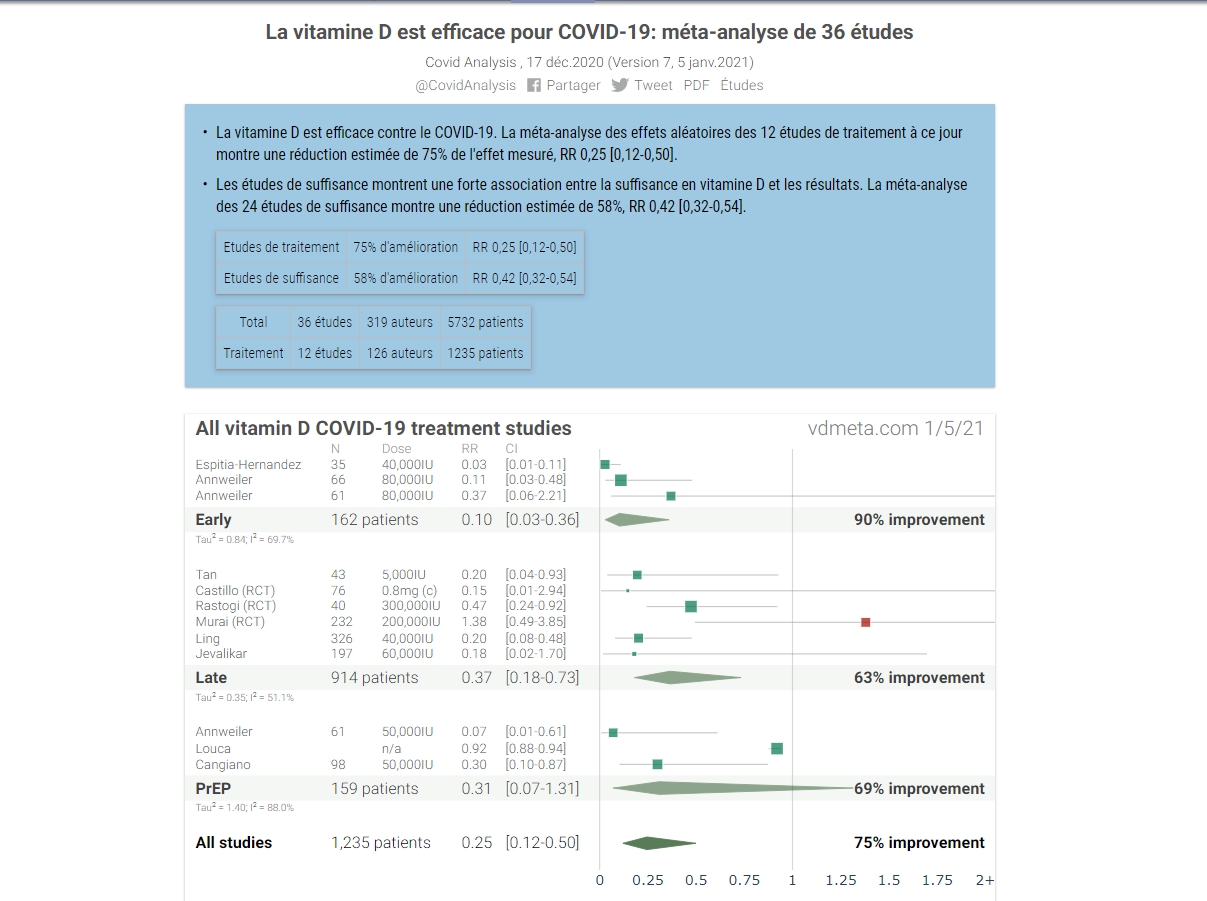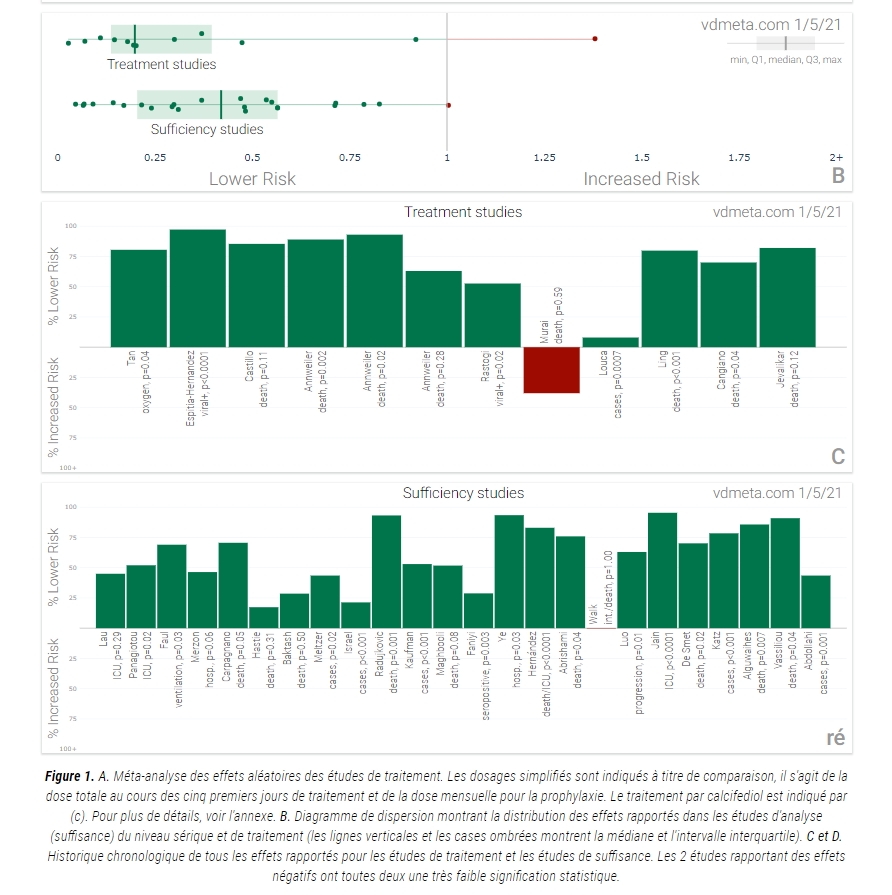 par Nutrimuscle-Conseils » 7 Jan 2021 01:34
par Nutrimuscle-Conseils » 7 Jan 2021 01:34
Sorting Out Whether Vitamin D Deficiency Raises COVID-19 Risk
Rita Rubin, JAMA. Published online January 6, 2021.
One of the risk factors du jour for coronavirus disease 2019 (COVID-19) has been vitamin D deficiency.
Even Anthony Fauci, MD, has said he takes a vitamin D supplement. Vitamin D “does have an impact on your susceptibility to infection,” Fauci, director of the National Institute of Allergy and Infectious Diseases, told actress Jennifer Garner in a September interview. “I would not mind recommending—and I take it myself—taking vitamin D supplements.”
Most people get some vitamin D from sunlight exposure, although individuals in the US get the nutrient mainly from fortified foods, such as milk, orange juice, and breakfast cereals.
At higher latitudes, people with more melanin content in their skin have lower blood levels of vitamin D because their skin doesn’t produce as much in response to sunlight. A recent article in the Journal of the National Medical Association speculated that vitamin D deficiency “is likely a significant factor” behind disproportionately high COVID-19 cases and deaths among US Black and Latino populations.
An analysis of data from 4962 participants in the National Health and Nutrition Examination Survey found that 1981 (39.92%) were vitamin D deficient, defined as a blood level lower than 20 ng/mL (<50 nmol/L). Vitamin D deficiency was greater in certain subpopulations, such as people with obesity or with type 1 or type 2 diabetes—all 3 of which have been associated with worse COVID-19 outcomes.
Despite Fauci’s recommendation and claims by many supplement sellers, conclusions about vitamin D blood levels’ connection to a host of diseases, including infections, cannot be determined because of mixed or sparse evidence, according to a recent report written for the US Preventive Services Task Force, which is updating its recommendation on vitamin D deficiency screening. The draft updated recommendation, like its 2014 predecessor, concludes that the evidence is insufficient to assess the benefits and harms of screening in asymptomatic adults for any reason.
“Vitamin D might be helpful in that there is evidence it can attenuate immune responses,” which could prevent the “cytokine storms” seen in some patients with COVID-19, A. Catharine Ross, PhD, chair of nutrition sciences at Penn State, wrote in an email. “On the other hand, attenuation might not be beneficial in terms of helping the antibody response.”
Mixed Signals
Research findings about vitamin D and COVID-19 have been mixed and sparse:
A study of 77 frail elderly patients hospitalized with COVID-19 in France concluded that vitamin D supplements taken regularly during the year before a COVID-19 diagnosis were associated with less severe disease and better survival than taking no vitamin D or receiving supplementation shortly after diagnosis. And a pilot randomized clinical trial of 76 patients hospitalized with COVID-19 in Spain found that treatment with high-dose vitamin D significantly reduced the risk of intensive care unit admission. However, only larger trials could provide a definitive answer, the authors wrote.
On the other hand, a study in a northern Italy hospital found no association between vitamin D and COVID-19. In a review article published in a different journal the same day as their study, the researchers in Italy concluded that poor vitamin D status appears to be linked to an increased risk of severe acute respiratory syndrome coronavirus 2 (SARS-CoV-2) infection, but age, sex, and comorbidities seem to play a more important role in COVID-19 severity and mortality. Nine days later, a different group of Italian researchers published an observational study of 324 patients with COVID-19 that found taking vitamin D supplements was not linked to risk of hospitalization but was associated with a higher risk of dying if hospitalized.
A recent study in JAMA Network Open by University of Chicago researchers linked vitamin D deficiency with a greater likelihood of testing positive for SARS-CoV-2. However, an earlier study of UK Biobank participants found no such connection. The Chicago researchers noted that vitamin D levels examined in the UK study predated COVID-19 diagnoses by at least a decade, so they could have changed by the time SARS-CoV-2 testing took place.
Behind the Headlines
Some of the evidence about vitamin D and COVID-19 doesn’t pass the smell test, according to a July letter to the editor of the British Journal of Nutrition.
The authors focused on an Indonesian retrospective study linking low vitamin D levels to a higher risk of dying from COVID-19. Although the publication had not been peer-reviewed, “it has taken the internet by storm,” garnering thousands of tweets, not to mention headlines in major news outlets, the letter writers noted.
The problem, they said, was that they couldn’t track down the authors of the study, which didn’t mention the names or number of hospitals involved. Plus, vitamin D levels aren’t routinely checked in Indonesia, so it’s unclear how the authors would have acquired that information retrospectively. Although the paper is no longer on SSRN, the preprint repository, it can still be found online.
In mid-October, the editors of PLoS One issued an “expression of concern” about a vitamin D study they had published 3 weeks earlier, which found that among patients hospitalized with COVID-19, those with vitamin D levels lower than 30 ng/mL were twice as likely to die than the others.
Only 31.06% of study participants had a laboratory-confirmed COVID-19 diagnosis and potential confounders might not have been adequately addressed. “Vitamin D levels may be indicative of comorbidities that may themselves impact COVID outcomes,” explained the editors, who said they are reassessing the article.
The editors also questioned the authors’ declaration of no competing interests. Public information suggests that corresponding author Michael Holick, MD, PhD, of the Boston University School of Medicine, does have competing interests, including consulting work, industry funding, and authorship of books (such as 2011’s The Vitamin D Solution), the editors wrote.
Conflicts of Interest?
By early December 2020, dozens of studies examining vitamin D and COVID-19, most of which had not yet started recruiting participants, were listed on ClinicalTrials.gov.
Whether any of these studies can settle the debate isn’t clear. The “sponsors and collaborators” section for several planned US studies lists parties that stand to profit if vitamin D deficiency is shown to worsen COVID-19 outcomes, raising the specter of conflicts of interest. In addition, at least 3 US studies plan to test vitamin D in conjunction with hydroxychloroquine, which has repeatedly been shown to be ineffective against COVID-19, most recently in JAMA.
“The credibility of clinical trials requires a hands-off approach from funders,” Ross noted. For that reason, she said, research sponsored by the National Institutes of Health (NIH) is preferred to that funded by the supplement industry.
However, none of the vitamin D and COVID-19 studies on ClinicalTrials.gov appears to be NIH-funded.
JoAnn Manson, MD, chief of preventive medicine at the Brigham and Women’s Hospital, is a principal investigator for one of the largest. In July, Manson coauthored a “call to action” to eliminate vitamin D deficiency during the pandemic. Two of the 11 sources it cited were the questionable preprint from Indonesia and a BMJ “Rapid Response” that also cited the preprint. Tishcon Corporation, a vitamin supplement manufacturer, and Quest Diagnostics, which markets a $69 vitamin D test directly to consumers, are among the sponsors and collaborators of Manson’s study, as are Sweden’s prestigious Karolinska Institute and Harvard Medical School.
Pediatrician Carol Wagner, MD, of the Medical University of South Carolina, is leading a study with 2 sponsors and collaborators that have a vested interest in the findings. ZRT Laboratory, a Beaverton, Oregon, company, sells a $75 vitamin D test directly to consumers. Grassroots Health Nutrient Research Institute operates “D*action,” “a global vitamin D population intervention program” that charges participants $65 for a vitamin D test. Holick serves on the institute’s International Scientists Panel.
The Upshot
Regardless of whether vitamin D protects against COVID-19, adequate levels are important for bone health.
“Avoiding vitamin D deficiency is always a goal,” Ross wrote. “If the diet doesn’t include vitamin D fortified milk or natural products like fish, then a supplement of the RDA [recommended dietary allowance] amount (600-1000 IU per day) provides good assurance. I consider this a ‘good idea,’ but I don’t want to leave the impression that diet cannot be sufficient.”















